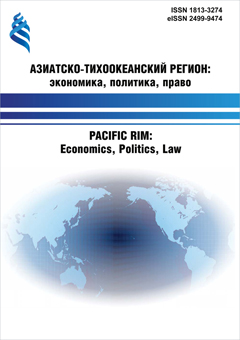CURRENT ISSUES OF INTERNATIONAL LEGAL REGULATION OF COOPERATION IN THE FIELD OF TRANSPORT AND LOGISTICS IN THE ASIAN-PACIFIC REGIONA NEW PARADIGM OF MODERNITY – THE CREATIVE ECONOMY
DOI:
https://doi.org/10.24866/1813-3274/2022-4/24-34Keywords:
international law, international logistics, international sanctions, transport, logistics, international electronic document management, EAEU, Asia-Pacific, SCO, logistics platforms.Abstract
The article discusses current trends in the development of international legal
regulation of the transport and logistics sector in the Asia-Pacific region, changes in the
international legal regulation of the industry that occurred as a result of changes in the geopolitical agenda, as well as the impact of digitalization processes and anti-globalization sentiments in the global economy on the formation of new trends in regulation of cross-border
logistics. Analysis of the influencing factors and trends in international legal regulation
made it possible to identify the key vectors of its development, as well as to formulate the
tasks that are relevant for creating a new paradigm for regulating interstate cooperation in
the transport sector in the Asia-Pacific region, taking into account the position of Russia
and China in the world at present and in the near future. The new paradigm of modernity is
the regionalization of the economy and, as a result, the transport and logistics cooperation.
In modern socio-economic conditions, when the international sanctions imposed against
Russia have changed the map of international cooperation, the formation of a transport and logistics ecosystem is one of the leading trends in the development of the industry. In the
context of digitalization and automation of processes, the disruption of Russian-European
logistics routes, and the strengthening of international cooperation in the Asia-Pacific region, it is necessary to modernize the international legal regulation of transport and logistics
cooperation in order to introduce a single digital platform that allows to fully ensure the 5th
level logistics provider, creating a standard for international electronic document management and an electronic invoice. The task of forming the international legal regulation of
interfacing digital logistics platforms of the EAEU and the Asia-Pacific countries is one of
the central ones for ensuring the resilience of the Russian economy and the development of
integration processes in the eastern part of Eurasia.



